Introduction
Welcome to our Diablo 4 Rogue beginners guide! In this section, we go over the various pros and cons the Rogue class has to offer, as well as their gameplay options. If you have been wondering whether or not the Rogue is for you – look no further!
As expected from previous Diablo titles, the Rogue prides itself in being a master of shadows, quick but lethal strikes up close or afar. As a result, the Rogue class is an incredibly fun class with ranged and melee options. On top of this however, Rogues have access to Ice or Poison playstyles too! Rogue is making a return in Diablo 4 after a time away from the franchise.
Pros
- Best-in-game mobility
- Multiple playstyles that differ vastly
- Insane burst damage
Cons
- Very squishy and position reliant
- Awkward timings to CC and kite enemies without dying
- Difficult to play at a high level
Resources
In Diablo 4, the Rogue class uses Energy as their resource, balancing the usage between their abilities.
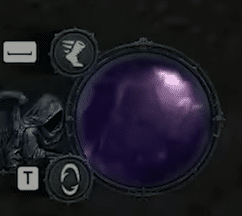
There is various other resource options for the Rogue, however they are locked behind specific specializations of which we will cover shortly.
Weapons
Rogue in Diablo 4 has access to a few weapons, as a result, this allows for moderate variety in your preferred playstyles and build paths. The Rogue can currently use the following:
- Ranged weapons such as Bows and Crossbows
- Two one-handed weapons such as Swords and Daggers
Currently, we personally recommend using whatever you prefer the most when playing the Rogue. The Rogue has so many legendary options in Diablo that you would best work on the stats and effects it provides rather than the weapon itself! Throughout leveling however or preference depending, feel free to experiment and try all the combinations. It is worth noting however that base weapon damage is relevant for the Rogue so always keep checking on the damage numbers when possible! Whichever main weapon you focus on, equipping any other weapon is always beneficial as a result of giving you the stats still.
Equipment Slots
Should you choose to play the ever versatile Rogue class, you can currently equip ten items in the available slots:
- Ranged weapons
- Duel-wield one-handed weapon
- Head
- Chest
- Hands
- Legs
- Feet
- Amulet
- Ring 1
- Ring 2
Starting out with your Rogue, feel free to equip every better piece of gear you find, ideally in the endgame the best in slot set is when you want to try and find specific pieces. As a beginner, getting a good idea of the class definitely comes first before optimizing and build min/maxing.
Stats
The Rogue in Diablo 4 much like every class in the game relies on specific stats that excel them more than others. Each class such as the Rogue receives specific benefits based on the Core Stats of the game:
Core Stats
- Strength – 0.1% Resource Generation
- Intelligence – 0.02% Critical Strike Chance
- Willpower – N/A
- Dexterity – 0.1% Skill Damage
Offensive Stats
Offensive Stats for the Rogue are largely dependent on the build path you choose, however your weapon damage is important. As a result, acquiring high Dexterity and some Intelligence for example on your weapon comes in handy. You can also use the following offensive stats to start helping your Rogue build:
- Critical Strike Chance
- Critical Strike Damage
- Other Stats that are build dependent such as Vulnerable based builds
Defensive Stats
Much like the Class-Specific stat benefits you can receive, your Core Stats also assist your base defensive stats, however this applies the same to all classes:
- Strength – +1 Armor per Stat
- Intelligence – +0.05% All Resistance per point
- Willpower – 0.1% healing Received and 0.25% Overpower damage per point
- Dexterity – 0.025% Dodge Chance per point
PvP Stats
PvP is a real thing in Diablo 4 was more of a dedicated focus to it. There are two stats that every class uses in PvP to keep things as level or simple as possible:
- Damage Reduction – decreases the damage reduction granted against other players
- Armor Contribution – a secondary armor stat that is PvP specific, giving you increased base damage reduction
There are various other stats useful to each class and depending on build, to see more options for your Rogue such as Utility Stats and more Defensive stats such as elemental resistances – check out our full Stats Guide!
Class Skill Groups
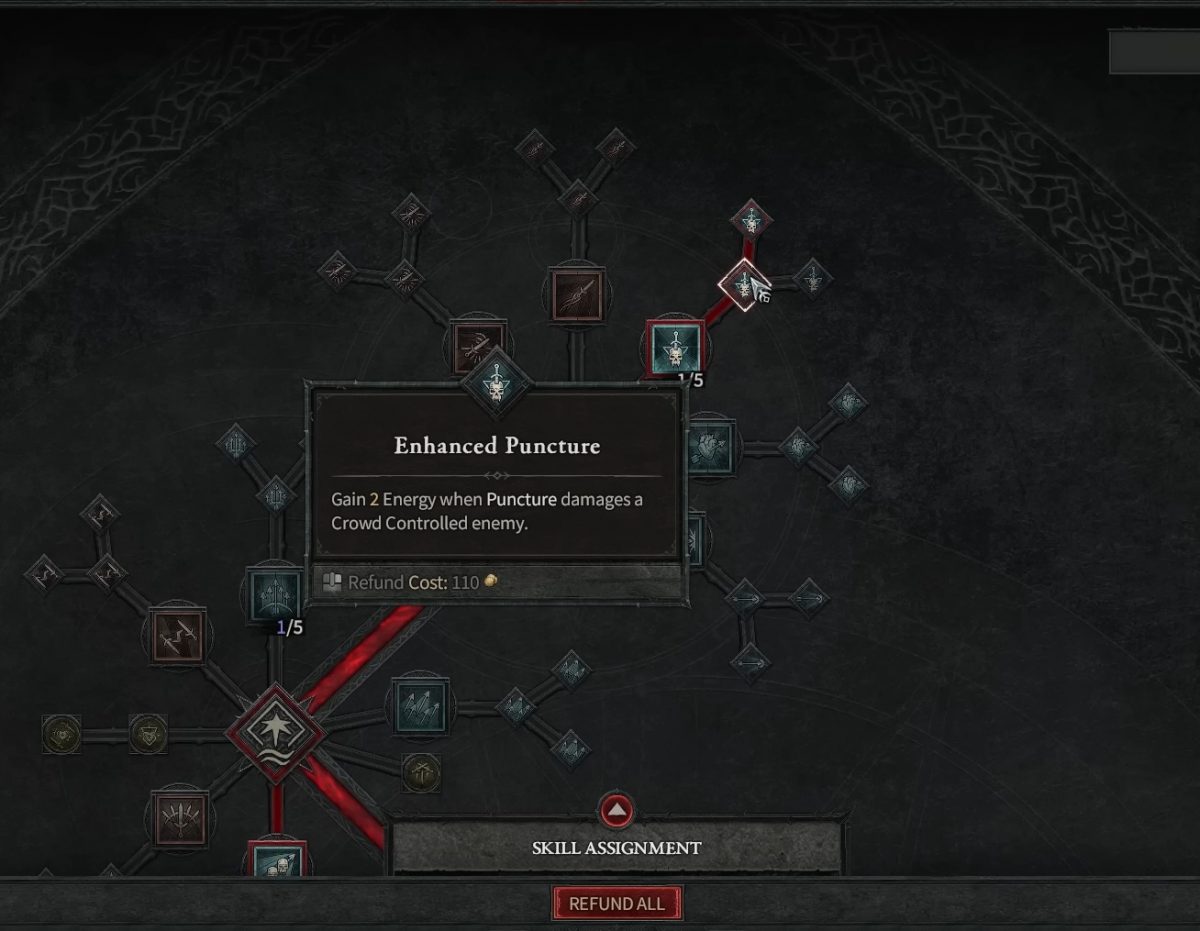
Diablo 4 does a great job of grouping sets of Skills to show their synergies and playstyle mechanics. Rogue has the following groups:
- Basic – resource generation skills, spam-able between skills and earning combo points
- Core – core damage dealing abilities that use the primary resource, your bread and butter
- Agility – Rogues vast mobility options
- Subterfuge – major utility options for the Rogue, place traps, daze enemies, conceal yourself and more
- Imbuement – Imbuement abilities enhance your next two attacks, awarding additional effects – much of your build path can revolve around the choices you make here, such as Ice, Poison or Shadow damage types
- Ultimate – the more powerful attacks you have access to, as a result, they have longer cooldowns
Most skills are also grouped into four key aspects:
- Physical
- Cold
- Shadow
- Poison
Class Mechanic – Specialization
Each class has a unique mechanic, defining the class and separating it from others. For the Rogue in Diablo 4, this mechanic is known as Specialization.
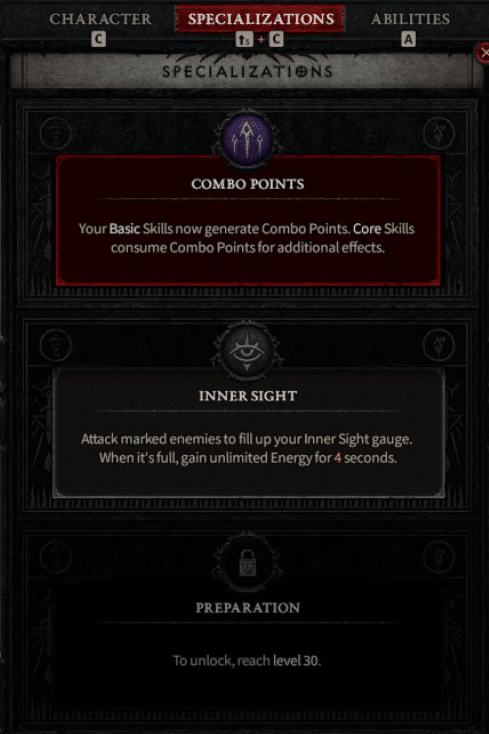
The term “Specialization” is a common theme in Blizzard titles, much like how World of Warcraft boasts Specializations for each class. With much similarity to this theme, Specialization allows the Rogue to move down one of three paths – drastically changing gameplay mechanics.
Combo Points
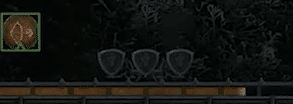
Combo Points is a Specialization for the Rogue that allows your Basic Skills to generate “Combo Points”. In turn, this also creates the opportunity to spend the built up points to improve Core Skills, bestowing additional effects and powers. Currently, a Rogue can generate a maximum of three Combo Points at one time.
Inner Sight
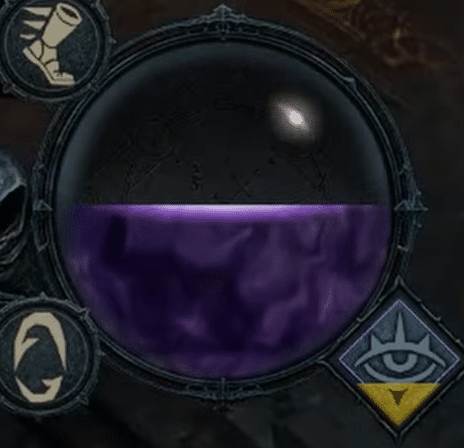
Inner Sight is another Rogue Specialization is unlocked at level 20. This specialization provides you with yet another mechanic change. To get the most out of Inner Sight, you must attack marked enemies to fill up the gauge found next to your energy. When the gauge is full, the Rogue will gain unlimited Energy for 4 seconds – allowing huge burst windows.
Preparation
Preparation is the third and final current Specialization in Diablo 4, unlocked at level 30. However, this Specialization was not accessible during the Beta, check back for more information on launch!
As you can see, the Rogue has so many options and playstyle paths to choose from, we recommend trying every Specialization out where possible. You never know, maybe you find that you dislike one Specialization but fall in love with another!
Aspects
Aspects are legendary powers that can be extracted or also imprinted onto items. You can grab these Aspects through dungeons and the Codex of Power and finding Legendary items. Take a look at the current potential options you can build your Rogue towards through Legendary Items:
- Aspect of Siphoned Protection – Lucky Hit: Damaging a Vulnerable enemy with a Core Skill has up to a 20% chance to grant a Barrier for 5 seconds that absorbs X damage, up to a maximum of X
- Aspect of Corruption – Your Imbuement Skill effects have x20% increased potency against Vulnerable enemies
- Aspect of Volatile Blades – Twisting Blades cause an explosion when the blades return to you, dealing X damage and X additional damage based on the distance the blades travel, up to 5m and X total damage
- Ghostwalker Aspect – You may move freely through enemies while below 40% total life
- Shadowslicer Aspect – When you cast Dash, a Shadow Clone is spawned at your location that also casts Dash, dealing 25% of the base damage
- Vengeful Aspect – Lucky Hit: Making an enemy Vulnerable has up to a 30% chance to grant +3% increased Critical Strike Chance for 3 seconds, up to a +9% cap
- Ravenous Aspect – Killing a Vulnerable enemy grants you x50% increased Energy Regeneration for 4 seconds
Rogue Builds
- 1-50 Leveling
- Shadow Imbuement (Twisting Blades)
- Penetrating Shot
- Poison Flurry
- Rapid Fire
- Barrage Shotgun
Diablo 4 Rogue Beginners Guide Conclusion
Thank you for checking out our Diablo 4 Rogue Beginners Guide! After launch we plan on providing more in-depth build for every class so check back for more! Good luck on your Rogue adventures! For more Diablo 4 content, click here.

